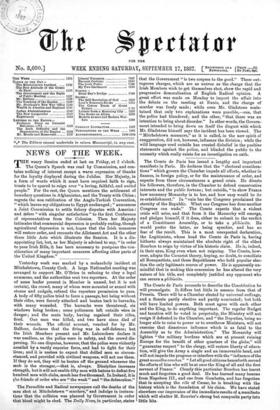The Comte de Paris has issued a lengthy and important
manifesto in Paris. He declares that the "electoral considera- tions" which govern the Chamber impede all efforts, whether in finance, in foreign policy, or for the maintenance of order, and expects from these circumstances a grand crisis. He directs his followers, therefore, in the Chamber to defend conservative interests and the public fortune; but outside, "to show France how necessary Monarchy is to her, and how easy would be its re-establishment." In "vain has the Congress proclaimed the eternity of the Republic. What one Congress has done another Congress can undo." The Comte expects that a violent crisis will arise, and that from it the Monarchy will emerge, and pledges himself, if it does, either to submit to the verdict of a Constituent Assembly, or to take a plebiscite. He would prefer the latter, as being speedier, and has no fear of the result. This is a most unexpected declaration, the Legitimists, whose head the Comte de Paris is, having hitherto always maintained the absolute right of the eldest Bourbon to reign by virtue of his historic claim. He is, indeed, in their eyes, King even when not reigning. The Comte, how- ever, adopts the Caesarist theory, hoping, no doubt, to conciliate all Bonapartists, and those Republicans who hold popular elec- tion the only legitimate source of power. He is apparently un- mindful that in making this concession he has altered the very nature of his title, and completely justified any opponent who can secure a plAiscite.






